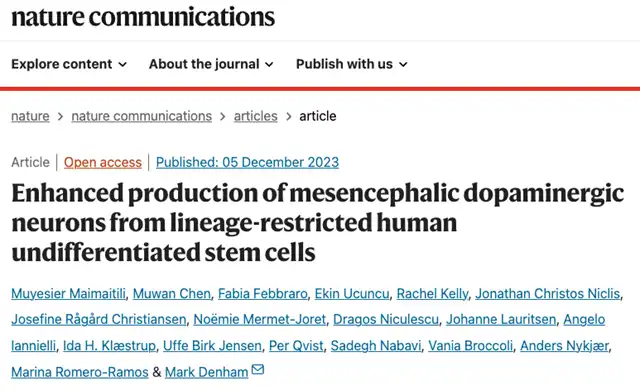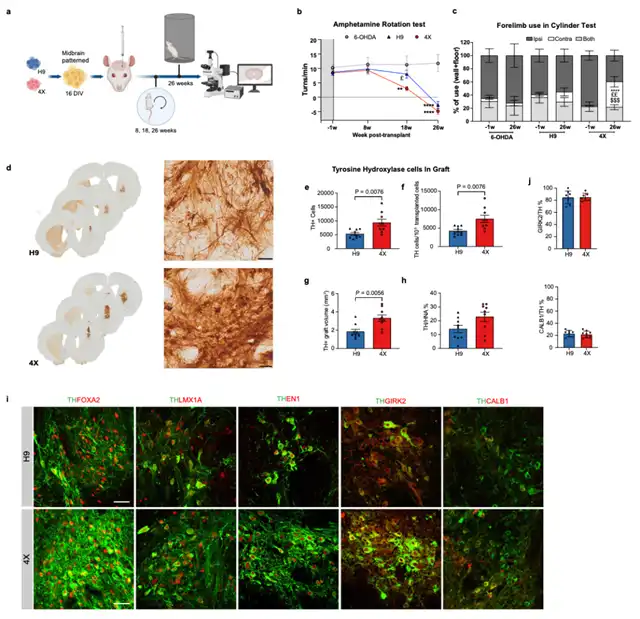Gene-Engineered Stem Cells Show Promise in Improved Parkinson’s Disease Treatment
- Normal Liver Cells Found to Promote Cancer Metastasis to the Liver
- Nearly 80% Complete Remission: Breakthrough in ADC Anti-Tumor Treatment
- Vaccination Against Common Diseases May Prevent Dementia!
- New Alzheimer’s Disease (AD) Diagnosis and Staging Criteria
- Breakthrough in Alzheimer’s Disease: New Nasal Spray Halts Cognitive Decline by Targeting Toxic Protein
- Can the Tap Water at the Paris Olympics be Drunk Directly?
Gene-Engineered Stem Cells Show Promise in Improved Parkinson’s Disease Treatment
- Should China be held legally responsible for the US’s $18 trillion COVID losses?
- CT Radiation Exposure Linked to Blood Cancer in Children and Adolescents
- FDA has mandated a top-level black box warning for all marketed CAR-T therapies
- Can people with high blood pressure eat peanuts?
- What is the difference between dopamine and dobutamine?
- How long can the patient live after heart stent surgery?
Gene-Engineered Stem Cells Show Promise in Improved Parkinson’s Disease Treatment
Parkinson’s Disease (PD), a complex neurodegenerative disorder and the second most common neurodegenerative disease worldwide after Alzheimer’s Disease (AD), affects approximately 1%-2% of individuals aged 65 and above.
With global aging populations, the prevalence of Parkinson’s disease is expected to significantly increase.
Currently, over 6 million people worldwide suffer from Parkinson’s disease, with approximately 60,000 new diagnoses each year. The loss of dopamine-producing neurons in the brain leads to motor and cognitive impairments, resulting in symptoms such as tremors, muscle stiffness, blurred consciousness, and dementia.
In recent years, research on using stem cells to treat Parkinson’s disease has made significant strides. Now, a groundbreaking study has yielded powerful results in terms of effectiveness without side effects for long-term treatment.
On December 5, 2023, researchers from Aarhus University in Denmark published a paper titled “Enhanced production of mesencephalic dopaminergic neurons from lineage-restricted human undifferentiated stem cells” in the journal Nature Communications.
The study utilized gene editing to knock out transcription factors GBX2 and CDX1/2/4 in pluripotent stem cells, creating lineage-restricted undifferentiated stem cells (LR-USCs) with enhanced capability to generate specific neurons—dopamine-producing neurons. In a rat model of Parkinson’s disease, this approach resulted in a more potent and sustained therapeutic effect.

Stem cells, differentiating into specific neurons, provide a promising new avenue for treating Parkinson’s disease. However, current differentiation methods from human pluripotent stem cells (hPSC) into midbrain dopamine-producing (mesDA) neurons yield low purity when transplanted in vivo. This low purity poses a significant challenge in liver cell therapy for Parkinson’s disease, emphasizing the importance of achieving high-purity differentiation for effectively restoring the motor abilities of Parkinson’s patients.
In this study, the research team used gene knockout methods to restrict cell fate and prevent differentiation into non-midbrain dopamine-producing (mesDA) neurons, enhancing differentiation into mesDA neurons.
Specifically, they focused on the early developmental stage, identifying transcription factors—GBX2 and CDX1/2/4—that are crucial for these lineages when major lineage choices are made but are not necessary for mesDA fate.
Through inducing functional loss mutations in lineage-determining genes expressed in non-dopamine lineages, they generated stem cells that could be expanded in an undifferentiated pluripotent state and limited in their potential during differentiation, naming them lineage-restricted undifferentiated stem cells (LR-USCs).
Importantly, LR-USCs generated significantly more mesDA neurons under midbrain and hindbrain conditions in vitro and in vivo.
The team genetically engineered pluripotent stem cells by knocking out GBX2 and CDX1/2/4 to prevent them from differentiating into the wrong types of neurons. The newly modified stem cells exhibited a stronger ability to generate specific neurons—dopamine-producing neurons.
Moreover, the study further demonstrated that these gene-engineered stem cells improved motor recovery in a rat model of Parkinson’s disease. Experiments on rat models revealed that the quantity and purity of cultured stem cells are crucial for the treatment’s effectiveness and duration. This breakthrough in treating Parkinson’s disease opens up a potential new approach for patients.

Professor Mark Denham, the lead author of the paper, stated that using our gene-engineered cells produced higher-purity midbrain dopamine-producing (mesDA) neurons. For patients, this could reduce the recovery time and decrease the risk of relapse and drug usage.
Our goal is to help patients move away from dependence on drug therapy, which requires high-purity dopamine-producing neurons. Building on this research, the next step is to advance our method into clinical trials.
Gene-Engineered Stem Cells Show Promise in Improved Parkinson’s Disease Treatment
(sourceinternet, reference only)
Disclaimer of medicaltrend.org
Important Note: The information provided is for informational purposes only and should not be considered as medical advice.



